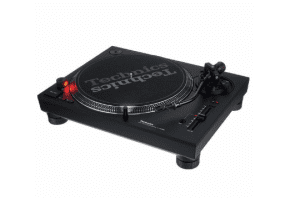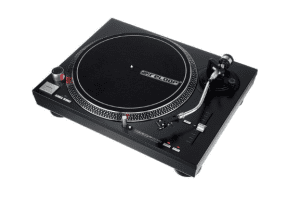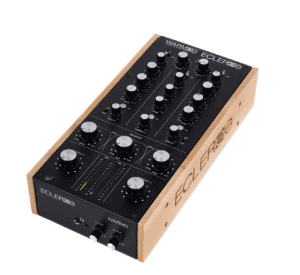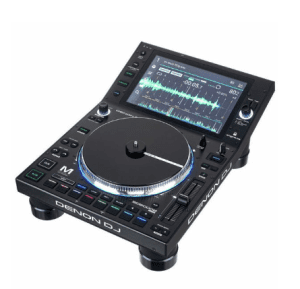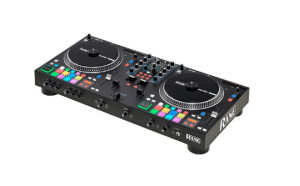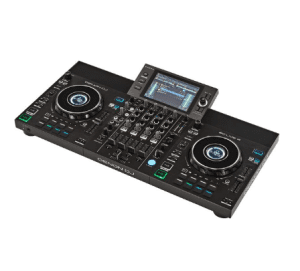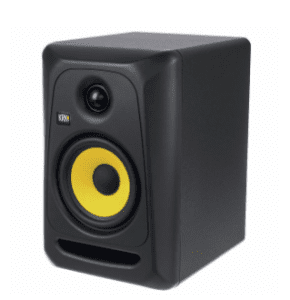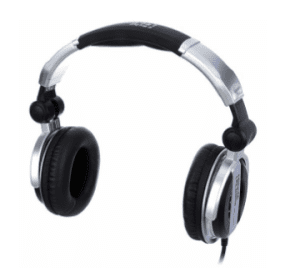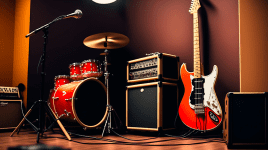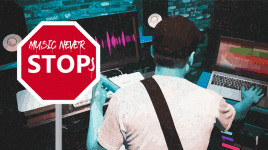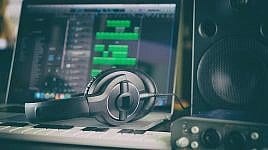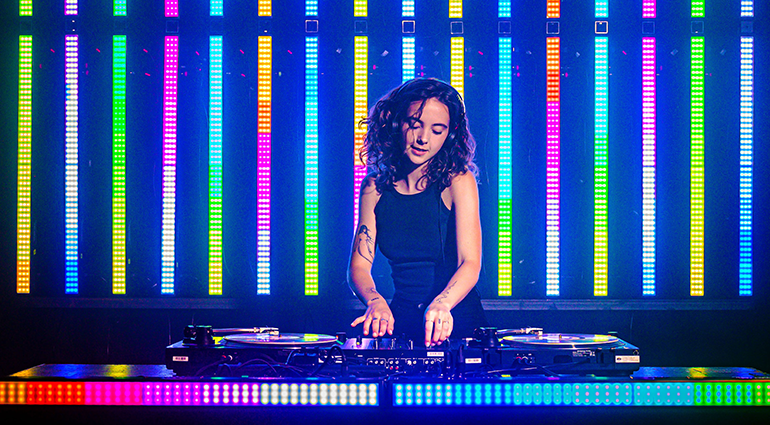
If you’re new to DJing, you’re faced with a huge selection of products that can bring you closer to your goal of becoming a DJ. The range of available hardware and software solutions can be overwhelming at first. But don’t worry, we’ve got your back! In this article, we’ll show you what’s important and what you should look out for when buying DJ gear.
Gear for DJ Beginners: Controllers, Media Players, Turntables …
If you want to play your favourite songs for your friends or a party crowd, you have many options. Classic turntable setups with a separate mixer, media players with screens, DJ controllers for computer software, or even DJ workstations with an integrated streaming function are just some of the available tools. Once you’ve made this basic decision, you can take a closer look at the products on offer. There is no right or wrong in this case, because what matters to the audience is the music ¬– and not the technology used to play it!
Gear for DJ Beginners: Vinyl Setup
If you opt for a classic turntable setup, you will need two turntables and a DJ mixer for mixing. When choosing a turntable, a direct-drive model is the best choice, as it helps to avoid potential beat-matching problems. All DJ turntables also have a pitch/tempo fader that you can use to manually adjust the BPM of your tracks.
Devices such as the Reloop RP 4000 MK2 offer a powerful motor and precise synchronisation for easy beat-matching. Many turntables come with included cartridges, so you can get started straight away. You can always upgrade the cartridge later and choose between spherical and elliptical needles, depending on whether you want to scratch or not. A DJ mixer is used to merge the signals from the two turntables. They’re available in three main categories: battle mixers, club mixers (some of which feature built-in audio interfaces), and mixers for fixed installations.
Battle mixers often have two channels and smooth-running channel- and crossfaders for battle-style mixing tricks. Mixers such as the Allen & Heath Xone 23 also offer a filter circuit for sound shaping. Club mixers like the Denon DJ X1850 Prime offer typical DJ effects such as delay, reverb, and filters, which you can use creatively to make your sets more interesting. The Numark M101 USB Black DJ Mixer is clearly structured and understands line and phono signals. This model also has a built-in audio interface that allows you to combine it with DJ software if you want to switch to digital DJing.
Installation mixers are designed with room for future expansions and can be permanently installed in a DJ booth. Models like the Behringer VMX1000 USB are available for a reasonable price, with up to seven channels at your disposal.
If you’re looking for a mixer off the beaten path, a rotary mixer can be a great choice. Instead of faders, these mixers have rotary knobs, which makes them a compact solution for mixing. However, they’re less suitable for scratching. For example, Ecler makes excellent devices like the 2-channel Warm 2 or the 4-channel Warm 4.
Gear for DJ Beginners: Media Player Setup
A media player setup (this includes devices with or without a CD drive) is similar to a turntable setup in that it consists of two players and a DJ mixer. Media players such as the DAP-Audio CORE CDMP-750 allow you to play audio CDs or digital media files (MP3, WAV) from a USB drive. The players have screens that show important information such as the remaining playing time and speed, which helps a lot while spinning.
You can also get creative with the loop function and memory locations for song positions (HotCue points). Tempo changes are also easy thanks to a pitch fader. A jog wheel replaces the turntable and allows you to control the playback directly. Denon DJ’s flagship players, such as the Denon DJ SC6000M Prime, even feature motorised turntables. For the mixer, the requirements are similar to a turntable setup, which means that you can choose between a battle mixer, club mixer, or installation mixer.
DJ Controllers
If you want to start your DJ adventure purely digitally, you will need a DJ controller and DJ software for your computer. DJ controllers are equipped with two decks, which look similar to media players, and also have an integrated mixer section with up to four channels. These devices also usually have a built-in audio interface that allows you to connect your speakers or amplifier directly. Most DJ controllers are designed to control specific software like Serato DJ, VirtualDJ, djay Pro, Rekordbox, or Traktor Pro. These popular DJ applications offer everything you need to start DJing. As they’re also compatible with streaming services such as Tidal, Soundcloud, Beatport, and Beatsource, you have access to an almost unlimited selection of songs for a monthly fee.

Native Instruments Traktor S3
The Hercules DJ Learning Kit MK2 is specially designed for beginners. This kit comes with Serato DJ Lite, and you can upgrade to the full version later when you need more advanced features. The included video tutorials help you get started.
Another option is the Native Instruments Traktor S3, which allows you to spin with up to four decks and connect a microphone. Some controllers like the Rane One even offer motorised turntables. Last, but not least, you’ll also need a computer to make the whole thing work. In addition to Windows or macOS computers, some controllers also support tablets.
Standalone DJ workstations
Standalone DJ workstations often look similar to large DJ controllers, but do not require a computer. These devices are equipped with large screens and contain DJ software that supports streaming services. DJ workstations such as the Numark Mixstream Pro+ or the Denon DJ SC Live 4 also have a built-in speaker.
Gear for DJ Beginners: Speakers, Headphones
Regardless of which DJ setup you choose, there are some pieces of gear that every DJ needs. For practising at home, you need suitable speakers, which shouldn’t be too small so that they can accurately reproduce the bass. That said, they don’t have to be huge PA speakers or subwoofers – your neighbours will thank you! Active speakers with a built-in amplifier are ideal, such as the KRK RP5 RoKit Classic or the Hercules DJ Monitor 32.
DJ headphones are essential for pre-listening to songs and controlling your mix. Working with headphones can take some getting used to, as you have to listen to the song to be mixed in with one ear and the song that’s currently playing with the other. The headphones shouldn’t be too heavy and they should be adjustable, so you can comfortably wear them over a longer period of time. Moreover, the cable should be long enough to give you plenty of freedom to move around. Headphones such as the t.bone TDJ 1000 are very suitable for beginners and are easy on the wallet.
A true classic among DJ headphones is the Sennheiser HD-25. If you prefer a larger over-ear model, take a look at the AKG K-182.
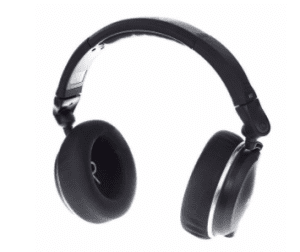
AKG K-182
DJ Equipment: Your No-Obligation Consultation
Are you aspiring to become a DJ and in need of equipment? Our knowledgeable team is ready to offer you no-obligation advice. Simply get in touch:
- dj@thomann.de
- For direct contact, follow this link.
- Explore our extensive range of DJ products here.
Gear for DJ beginners: Your Feedback
What does your DJ setup look like? Do you prefer analogue or digital and would you choose individual components or an all-in-one controller? And which DJ gear do you swear by? Let us know in a comment!
You are currently viewing a placeholder content from Facebook. To access the actual content, click the button below. Please note that doing so will share data with third-party providers.
More InformationYou are currently viewing a placeholder content from Instagram. To access the actual content, click the button below. Please note that doing so will share data with third-party providers.
More InformationYou are currently viewing a placeholder content from X. To access the actual content, click the button below. Please note that doing so will share data with third-party providers.
More Information